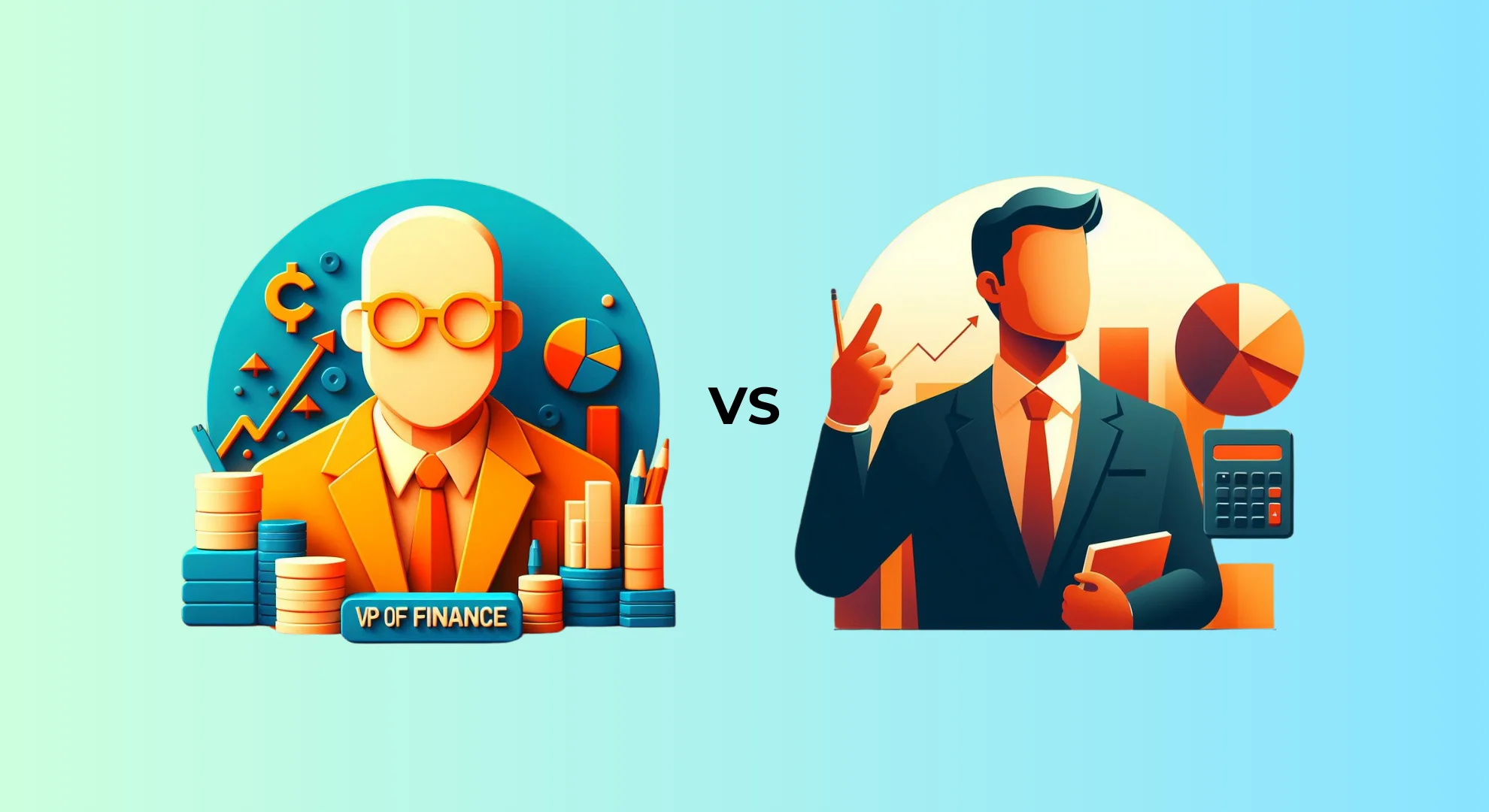Leadership positions are essential in the ever-changing realm of finance to ensure a company’s financial well-being and drive its growth prospects. The roles of Vice President of Finance (VP of Finance) and Chief Financial Officer (CFO) are two significant positions that require clarification. Although both titles are substantial in a company’s financial structure, their duties and strategic priorities vary. This article analyzes the debate between the VP of Finance and the CFO, highlighting their critical differences.
Table of Contents
VP of Finance vs. CFO: Definition
VP of Finance: The VP of Finance is a senior leader of the finance department overseeing day-to-day operations. They act as a central point of contact for all financial activities, manage a team of accounting professionals, and ensure the smooth functioning of economic processes.
CFO: The CFO is a company’s top financial executive, sitting at the C-suite table. They are responsible for the organization’s overall economic strategy and health, encompassing strategic planning, risk management, investor relations, and ensuring financial alignment with its broader goals.
VP of Finance vs. CFO: Similarities
Despite their differences, both VP of Finance and CFO roles share some key similarities:
- Financial Expertise: Both positions require a strong foundation in accounting principles, financial analysis, and budgeting.
- Leadership Skills: Effective leadership is crucial for both roles. Leaders must motivate and guide financial teams while fostering collaboration and communication.
- Regulatory Compliance: Ensuring adherence to financial regulations and reporting standards is a shared responsibility of the VP of Finance and CFO.
- Technology Adoption: Both positions require understanding and leveraging cloud-based accounting software and financial technology (FinTech) solutions.
VP of Finance vs. CFO: Differences
Their dedication to financial management is evident by their similarities. However, their focus, responsibilities, and reporting structure are the main areas where they differ. Here is a table to elaborate:
| Feature | VP of Finance | CFO |
| Focus | Day-to-day financial operations & internal matters | Overall financial strategy & external matters |
| Responsibilities | Overseeing accounting, bookkeeping, & payroll, Budgeting & financial forecasting, Financial reporting & analysis, Implementing & managing internal controls | Strategic financial planning & analysis, Risk management & mitigation, Investor relations & fundraising, Mergers & acquisitions (M&A), Overseeing the VP of Finance |
| Reporting Structure | Reports to the CFO | Reports to the CEO |
| Experience | Typically, 10+ years of experience in accounting | Extensive experience (15+ years) with a proven track record of strategic financial leadership |
Additional Points of Distinction:
- Salary: CFOs typically command higher salaries due to their broader responsibilities and strategic decision-making.
- Company Size: Smaller companies might have a combined VP of Finance/CFO role, with one person handling both responsibilities. As a company grows, the roles become more distinct.
- Future Career Path: For aspiring CFOs, the VP of Finance role is a stepping stone, demonstrating their ability to handle complex financial operations before navigating the broader strategic aspects of being a CFO.

VP of Finance vs. CFO: Roles and Responsibilities
Responsibilities of the VP of Finance:
- Bookkeeping and Accounting Operations: The VP of Finance ensures the accuracy and efficiency of day-to-day accounting tasks, including accounts payable, accounts receivable, and payroll.
- Financial Reporting and Analysis: Preparing accurate and timely financial statements (e.g., balance sheets and income statements) and providing insightful financial analysis to internal stakeholders.
- Budgeting and Forecasting: Developing and managing the company’s budget, including revenue projections, expense control, and long-term financial forecasting.
- Internal Controls: Implementing and maintaining strong internal controls to safeguard company assets and prevent fraud.
- Financial Systems and Technology: Selecting and managing cloud-based accounting software solutions to streamline financial processes and data management.
- Relationship Management: Maintaining working relationships with accounting firms, financial institutions, and external auditors.
Responsibilities of the CFO:
- Strategic Financial Planning involves developing and implementing long-term financial strategies aligned with the company’s goals. This includes capital allocation, resource management, and investment decisions.
- Risk Management involves identifying, assessing, and mitigating potential financial risks such as market fluctuations, currency exchange rates, or economic downturns.
- Investor Relations: Communicating financial performance to investors, building trust and confidence through clear and transparent presentations.
- Fundraising: This includes leading fundraising initiatives, preparing financial documents for potential investors, and negotiating debt or equity financing terms.
- Mergers & Acquisitions (M&A): Evaluating potential mergers or acquisitions, conducting financial due diligence, and negotiating terms that benefit the company.
- Compliance Oversight: Ensuring adherence to all relevant financial regulations and reporting standards.
- Leadership and Team Management: Providing strategic guidance and leadership to the entire finance department, fostering a culture of collaboration and high performance.
Choosing the Right Role: VP of Finance or CFO
The ideal role, VP of Finance or CFO, depends on your career stage, skillset, and desired level of responsibility. Here’s a quick guide:
VP of Finance:
Ideal for individuals with:
- Strong accounting and financial analysis skills.
- Expertise in guiding and overseeing a group of accountants.
- A passion for operational efficiency and process improvement.
CFO:
Ideal for seasoned financial leaders with:
- Extensive experience in strategic financial planning and analysis.
- Having demonstrated success in the past, and possess a track record that proves the ability to drive financial growth and profitability.
- Excellent communication and interpersonal skills to represent the company to investors and other stakeholders.

Conclusion
Understanding the distinction between VP of Finance and CFO is crucial for companies building their leadership teams and for aspiring financial professionals charting their career paths. Both roles play a vital part in ensuring financial health and driving growth.
For companies, selecting the right leader depends on their size, stage of development, and financial complexity. CFO services providers can offer valuable guidance in evaluating your needs and identifying the ideal financial leadership structure.
Understanding the different responsibilities can help aspiring financial professionals tailor their skillsets and experiences to pursue their desired career paths within the dynamic world of finance.










